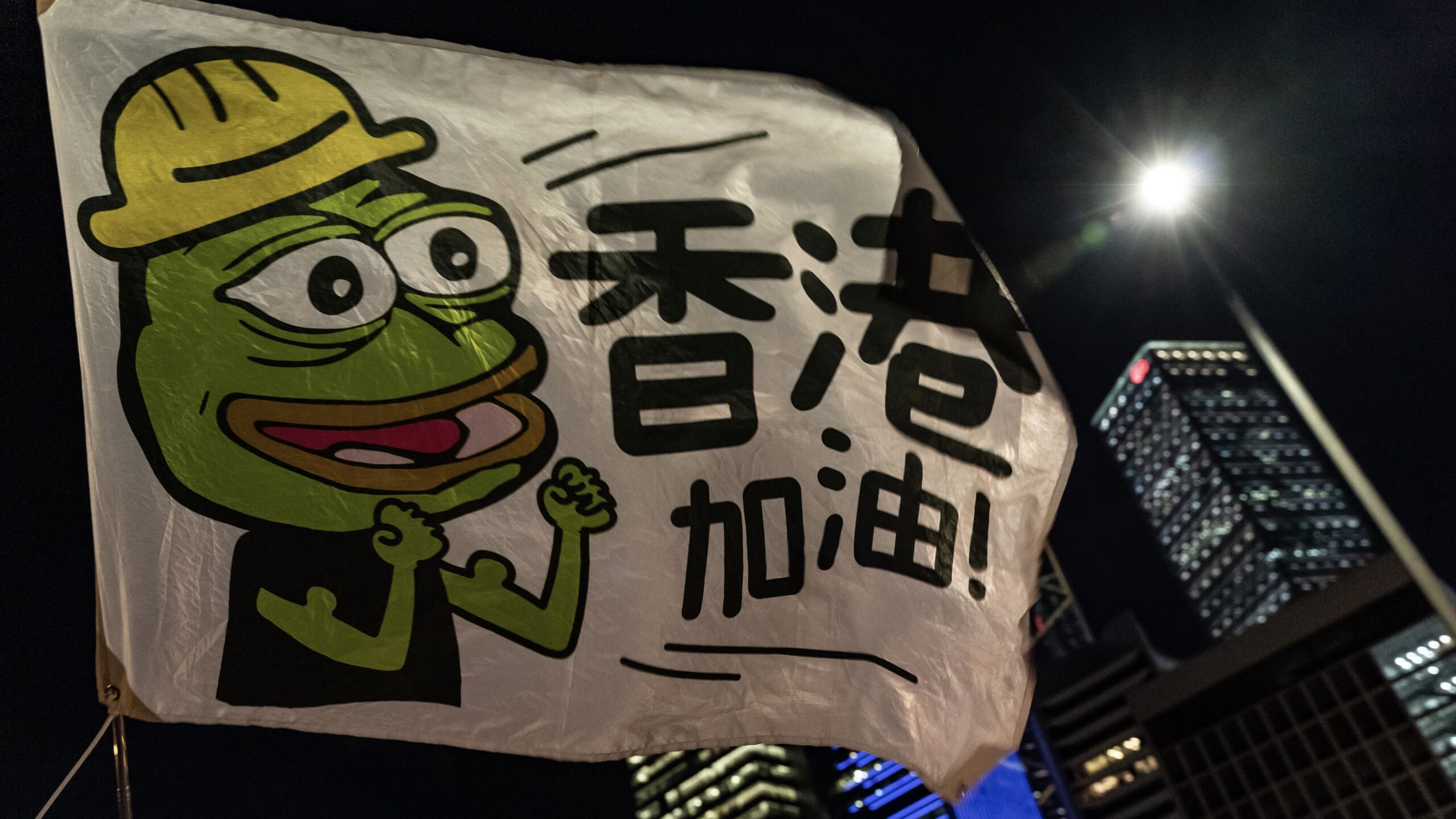Hong Kong firms as global crypto hub after fresh announcement; Will Conflux and Pepe pump?

A pro-democracy protest banner featuring Pepe the Frog in 2019. (Getty Images)
If you were wondering if the Hong Kong crypto hub chatter had any real substance or weight, one of the Special Administrative Region of China’s main financial regulators has made an affirming announcement this week.
The Hong Kong Securities and Futures Commission (SFC) has revealed it will begin accepting applications for crypto-trading platform licences on June 1, according to a statement it released yesterday.
And this essentially means retail crypto trading is being enabled in the Chinese-owned but largely autonomous region… which is as close as you can get to saying China is, at long last, back in the crypto trading and investing game, without that completely being the case.
The regulator has made it clear it’s allowing licensed virtual asset providers to serve retail investors, provided that operators “comply with the SFC’s standards”, which will come into effect on June 1.
It has clarified that those standards will include the “safe custody of assets, segregation of client assets, avoidance of conflicts of interest and cybersecurity standards and requirements expected of licensed trading platforms”.
https://twitter.com/tedtalksmacro/status/1660929971055910912
There are a couple of sticking points for now, so it’s not all rainbows and sunshine for the crypto industry in HK just yet. (Although on the whole, it’s still potentially pretty good news for a crypto market seeking an injection boost of interest, capital and liquidity from somewhere significant other than the United States.)
Those sticking points are… firstly, the SFC is delaying the approval of trading of stablecoins until the Hong Kong Monetary Authority has regulations for this crucial crypto sub-sector firmly in place.
And secondly, crypto “gifts” with the intention of incentivising retail investments, will be off the table – banned – at least to begin with. And that reportedly means crypto airdrops.
Could this kick-start a Chinese influx of capital into crypto?
There are those, and we’re beginning to wonder if a groundswell is forming here, who certainly believe this could be the bullish catalyst the hopium-filled crypto market is craving this year.
Certainly, we’ve been noticing some of the more popular “Chinese coins” having some price-action pumpage here and there on the back of this embryonic narrative.
Over the past two weeks, tokens Conflux’s CFX (+23%) and NEO (NEO) (+11%) have both seen reasonable gains, without yet setting the crypto world on fire, as such.
NEO was once dubbed, back in the late stages of the 2017 bull run, the “Chinese Ethereum”, a mantle that now seems to have passed to Conflux.
According to yet another pseudonymous Twittter account, “Elons Dev”, the memecoin Pepe (PEPE) stands half a chance of benefitting from a Hong Kong crypto bump, too. And that’s because, the Pepe the Frog character was recently adopted by several Hong Kong residents as a symbol of resistance and freedom.
Look, that’s a tenuous link for $PEPE holders, but tokens don’t always need catalysts enshrouded by great meaning in order to absolutely rocket.
1/ 🚀🔥 "Chinese Ethereum" Conflux and $PEPE are poised to soar as Hong Kong opens its doors to retail crypto traders from June 1. Here's why. 👇 pic.twitter.com/G1Z7XqisWg
— ElonsDev (@elonsdev) May 24, 2023
If you’re selling your $PEPE now, before Hong Kong starts to buy crypto again after years of being banned. You are blind. pic.twitter.com/LuPjTpLJgw
— Mik Cosentino (@mikcosentino) May 24, 2023
The only cold-watered doubt we’ll cast over a possible Hong Kong-induced $PEPE pump, however, is that token listings on local HK exchanges will reportedly have very tight parameters. And that includes an initial rule that non-security tokens must have a “12-month track record of no negative behaviour”.
That said, it remains to be seen how Hong Kong regulations will tackle the usage of decentralised exchanges, upon which users can buy PEPE and multitudes of other altcoins. That seems like a grey, or little-discussed, area in all this for now.
In any case, the rumours are flying around Twitter at present that, despite China and Hong Kong operating as two separate entities with different legal frameworks, the latter could be a testing ground for the implementation of fresh crypto policy in China.
The cryptoverse sure loves to dine out on tasty speculation…
BREAKING: 🇭🇰 Hong Kong's #Crypto Revolution 🔥
🇨🇳 Experts believe Hong Kong is becoming a "TESTING GROUND" for China's crypto adoption strategy! 😱
A thread 🧵 pic.twitter.com/d7GFrc4PR9
— Keyur Rohit (@CryptoKingKeyur) May 24, 2023
5/🌐 These new #crypto rules could pave the way for China's long-awaited comeback into the crypto world.
After banning crypto in 2017, could this be China's chance to embrace blockchain and decentralization? 🇨🇳
— Keyur Rohit (@CryptoKingKeyur) May 24, 2023
We’ve referenced this tweet from Aussie analyst Miles Deutscher before, but here it is again (below), as it provides a decent list of coins that have, or have had in the past ties to Chinese markets. And that’s through merit of either being built or based in China originally (before the nation effectively banned crypto trading and mining in late 2o21), or simply through popularity with Chinese investors.
On June 1st, Hong Kong crypto exchanges will be allowed to offer their services to regular customers.
If alts catch a bid, I expect Chinese-related coins to perform strongly.
Here is my watch-list:
(1/3) pic.twitter.com/PTUwtNZgdO
— Miles Deutscher (@milesdeutscher) May 17, 2023
Related Topics
UNLOCK INSIGHTS
Discover the untold stories of emerging ASX stocks.
Daily news and expert analysis, it's free to subscribe.
By proceeding, you confirm you understand that we handle personal information in accordance with our Privacy Policy.








